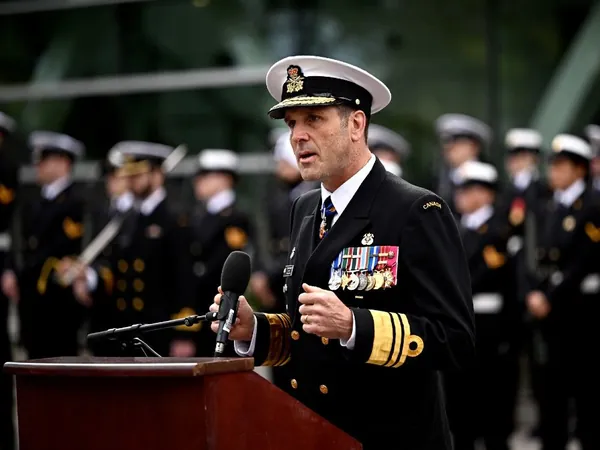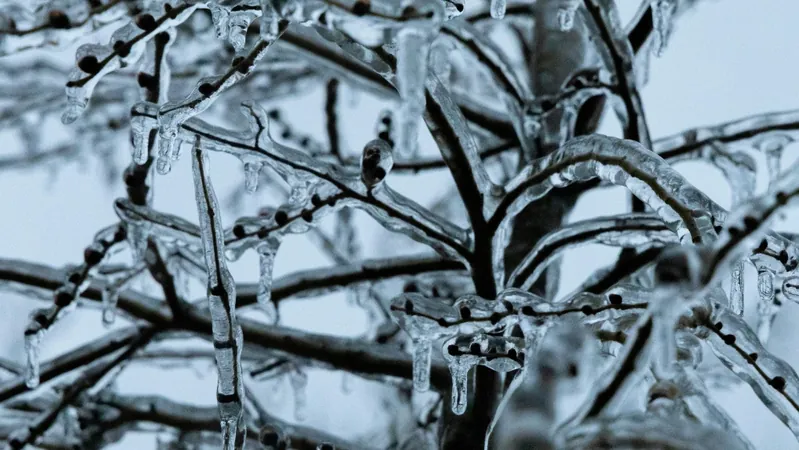
Canada is Ready to Defend the Arctic: Naval Chief Confident Against Russian and Chinese Intrusions
2024-11-25
Author: William
In a bold statement amid rising geopolitical tensions, Canada's top naval commander, Vice-Admiral Angus Topshee, has expressed confidence in the nation's ability to prevent potential incursions by Russia and China into the strategically significant Northwest Passage. He emphasized that Canada's relatively new Arctic and Offshore Patrol Ships (AOPS), though currently armed with only a 25-mm cannon, can be quickly reinforced with additional weaponry if the need arises.
"We wouldn’t need allies to come to our aid. We could deal with it ourselves," Topshee declared, reassuring Canadians of the navy's operational readiness in safeguarding Canadian sovereignty.
Arctic Readiness and Strategic Mobility
While the AOPS are not intended as frontline combatants, Topshee noted that they possess all necessary capabilities for their anticipated missions. Should the situation escalate and require increased armament, the navy has the flexibility to adapt swiftly, akin to defensive measures taken by ground forces at forward operating bases.
During a recent interview at the Halifax International Security Forum—centered on Arctic sovereignty and the implications of Russia's war in Ukraine—Topshee stressed that neither Russia nor China has transited through the Northwest Passage without Canadian approval. He highlighted the importance of vigilance in light of Russia's disregard for international law, particularly following its invasion of Ukraine.
The Need for Advanced Submarine Capabilities
Looking to the future, Canada plans to procure 12 modern, non-nuclear submarines to replace older models. Topshee envisions a sophisticated fleet capable of patrolling vast areas of the Arctic undetected, engaging in covert operations to maintain Canada’s northern defense.
Exploring New Frontiers: Arctic and Antarctic Missions
To maintain engagement and leverage the Arctic's strategic significance, Canada’s patrol ships are set to venture beyond the northern territories. For instance, the HMCS Margaret Brooke is slated to circumnavigate South America and potentially make history with the first Canadian naval visit to Antarctica. This expedition aims to bolster understanding of polar environments, especially as China intensifies its presence in both Arctic regions.
Adapting to Modern Warfare Techniques
Despite the navy's advancements, Topshee underscored the ongoing evolution of modern naval warfare, particularly in light of Ukraine's innovative use of drones. Canadian forces are critically examining how these strategies can be adapted to national defense scenarios, enhancing both offensive and defensive capabilities.
In conclusion, with climate change further complicating Arctic navigation and an intensifying global focus on the region, Canada recognizes the pressing need for robust military capabilities. Vice-Admiral Topshee's comments reflect a commitment to ensuring security and sovereignty in the Arctic, even as challenges continue to evolve. The message is clear: Canada is prepared to stand firm against any threats to its northern territories.









 Brasil (PT)
Brasil (PT)
 Canada (EN)
Canada (EN)
 Chile (ES)
Chile (ES)
 España (ES)
España (ES)
 France (FR)
France (FR)
 Hong Kong (EN)
Hong Kong (EN)
 Italia (IT)
Italia (IT)
 日本 (JA)
日本 (JA)
 Magyarország (HU)
Magyarország (HU)
 Norge (NO)
Norge (NO)
 Polska (PL)
Polska (PL)
 Schweiz (DE)
Schweiz (DE)
 Singapore (EN)
Singapore (EN)
 Sverige (SV)
Sverige (SV)
 Suomi (FI)
Suomi (FI)
 Türkiye (TR)
Türkiye (TR)